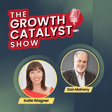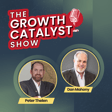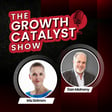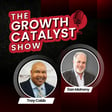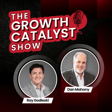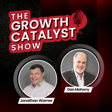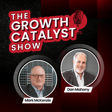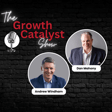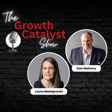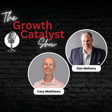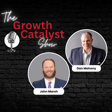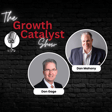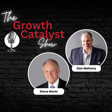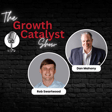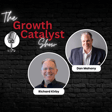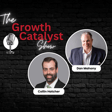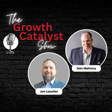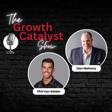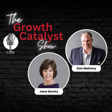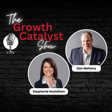Become a Creator today!Start creating today - Share your story with the world!
Start for free
00:00:00
00:00:01

Changing the Game: Innovative Outsourcing's Approach to Flexible Employment Solutions
In this episode of The Growth Catalyst Show, we take a look at the motivations behind Cindi Filer's decision to start Innovative Outsourcing and how it has grown into a family business with the involvement of Matt Filer. Understand the philosophy that drove Cindi to establish a company that provides a supportive work environment for part-time professionals and fills a critical gap in the HR services market. We'll also explore how Matt's role has reinforced the company's mission and the dynamics of running a successful family business within the HR industry.
Transcript
Introduction to The Growth Catalyst Show
00:00:00
Speaker
Welcome to The Growth Catalyst Show where we believe that growth can come in many forms, professional, personal, company, sales, you name it. I'm your host, Dan Mahoney, founder of Transcendent Sales Solutions and a guide to a world of growth possibilities. I've spent my career empowering companies and their people with strategies that accelerate growth. I'm here to bring you stories of these business leaders and their trusted advisors to gain insights into their journeys and learn how they fueled their own growth. Just maybe their journey could become part of your own growth story. Are you ready? Let's grow.
00:00:34
Speaker
Welcome to the next edition of The Growth Catalyst Show.
Meet Cindy and Matt Filer
00:00:37
Speaker
I'm your host, Dan Mahoney, and I am pleased to have two guests here today. Cindy Filer is the founder of Innovative Outsourcing after leaving the traditional workforce to raise her children. and Cindy has led a unique staffing company dedicated to connecting businesses with experienced professionals seeking part-time employment. And Matt Filer is the vice president of client relations and marketing with Innovative Outsourcing, a graduate of UGA, a Go Dawgs. He went to work for the Chick-fil-A leadership development program where he was in charge of hiring, recruiting, and training and retention for two Chick-fil-A locations. Matt joined Innovative Outsourcing in 2018. Matt and Cindy, welcome to the Growth Catalyst Show. Hey, we're so glad to be here. Thanks for having us. Thank you so much.
00:01:21
Speaker
I'm glad to have you guys. So, you know, Cindy, you and I have known each other for so long. ah ah We're invested together and we've shared a lot. And, you know, one of the reasons why I wanted to have you and Matt on today is you just I just love your story. You have such a great story of how you started your business. um And I want everybody to hear it and learn about your business. And um so really glad to have you today. Thanks. Thanks for having me. Yes. It's been a ah long, long relationship with you over the years. So that's been really fun. It has been. So, you know, you went to, and I know a lot about you. um You went to Wake Forest. I think I know a lot about you. went Yeah, I'm going to find out real quick.
Cindy's Educational Background
00:02:06
Speaker
but she went to ah when you When you went to Wake Forest and you had a degree in mathematical economics, what was the plan on doing that?
00:02:15
Speaker
Yeah, that's a good thing. There was no plan. um So interestingly, nobody told me that you should go and pick a career based on what you actually want to do. I just happened to have a math teacher who I really liked who said, you should be a math major. And then I ran into an economics teacher at Wake Forest because Wake Forest is a um ah liberal arts school. And so you have to take a little bit of everything. In my freshman year, I ran into an economics professor and he was phenomenal. And he was like, you know, we have this new major that's mathematical economics and you should be in that major because you like math and you really like economics. And and so I said, yes, not knowing what job that would get me. um And I should have had a clue because I should have been there were only eight of us in the major.
00:03:02
Speaker
And seven of them were men that were very studious and didn't speak a lot. And I was a cheerleader and came in in my cheerleading uniform. I was like, hey, how's everybody doing? Somebody should have stopped me and said, this is probably not the right major for you. But they did not. Imagine if you would have really liked your instructor who was like a film studies or something where you could do, right? Yeah, if there's anybody who can talk into anything at that point. So yeah, who knows what I would do. You're just really impressionable in college. So yeah, somebody should have stopped me. But what most people did with that major was actuarial work, which is a great line of work. It just wasn't the best line of work for me. Yes. So I became a bachelor.
00:03:47
Speaker
You became a banker and went into banker where there's numbers. What was the early years for you as far as corporate out of school?
Cindy's Corporate Journey
00:03:55
Speaker
Yeah. So I took a job at the first union as a corporate lender. Um, so I did a bunch of work on, um, you know, it kind of the, the business of finance. Um, so with a background in mathematical economics, it was really easy to go into helping companies with their financials and helping them understand what they could, could do as far as loans and what their books should look like. Um, which I never ended up doing, but it was a great thing to know being a business owner later on.
00:04:25
Speaker
um Because, you know, being a business owner, there are highs and lows financially. And I knew how to look at that from a financial perspective because of my banking years. Talk about the pivot into HR and where that all started and how that came about. Yeah, so that was an interesting pivot. I was a little mad about it. So um my husband, um we were in North Carolina at the time. I was in Charlotte, and I was in um banking for First Union. um And Don got in grad school at Georgia Tech. And so we needed to pivot to Atlanta. And so but about that time, First Union was buying up a lot of banks down here, and it was ugly. That whole process was ugly. So they said I could transfer down here.
00:05:11
Speaker
But I kind of thought, this is a good exit out of banking for me. Not that banking's not great. It just probably wasn't my my thing. And so um one of my husband's friends in college um happened to be have a dad that was fairly high up at Delta and so Airlines. And so I decided to go ask him and say, could I have a job? And he said, yeah, we have this great leadership development program. You'll be spending um a couple of months with each of our senior leaders, um from marketing to finance to HR. And then as soon as that's over, we'll place you in a job. And so Mother Delta, in there in her wisdom, um with my mathematical economics major and my finance background, decided I should be in HR.
00:05:54
Speaker
And I got that placement after that and I was so angry. I was like wait i'm i'm a numbers girl You know hr is kind of touchy feely. It's all you know, how you feel about things and making people happy and I like the numbers And so I was a little angry. I was thinking do I leave delta? What do I do? um and What I found out was that's when HR was actually pivoting to numbers. It was pivoting to all the comp and all the numbers and all the statistics driving leadership and driving um the people side of the business. And I was right on the cusp of when that was happening. And I had the background and the numbers that really made it a good fit. So that's how the pivot happened. And I've been in HR every year since then.
00:06:38
Speaker
And it came around it came around from your so your mathematics, actually. You wouldn't have got to where you're at if you would have been there. So and it's it's an advantage now. Yeah, now it's an advantage. you know You kind of look back on those jobs I always talk about to young people about how they're always upset about the career choices that they've made. And I'm like, until you get to be our age, you can't really look back and see, yeah, that might have been a bad job or that might have been something I didn't love to do. But that piece, that nugget I learned back then, wow, that fits into the puzzle of what my job is today. And that's pretty cool to look back at.
00:07:10
Speaker
So let's go back to 1995.
Founding Innovative Outsourcing
00:07:14
Speaker
Tell us how you decided to start Innovative Outsourcing and how it all came about. and yeah so I ruined your life. It's all your fault, Matthew. Yeah, yeah. Hand up. I'll take this one. This one was probably my fault. It was his fault. So um we decided to have Matt. And I was at this point, I had gone from Delta to one of their subsidiaries helping start their ah HR function. um And so so um ah we were gonna have Matt and we'd been married about five years and um I just felt like I was called to be a stay-at-home mom. So not that everybody should be or or even should want to be but I just felt like I was called to be home with him. So I started staying home and I realized that I really missed work. um i I loved Matt but I really missed that piece of me that was that and that corporate person. um But I knew I was in the right place for what I was supposed to be doing. But um Delta and the subsidiary and a couple of other companies, they started giving me jobs to do. Some were bookkeeping jobs. Some were because I had this finance background. Some were HR kind of jobs to do while Matt was napping. And it was kind of a lifeline for me. And all of a sudden, that idea was born is that you didn't have to just do full-time work as a mom or stay at home. Because back then, part-time wasn't a thing.
00:08:30
Speaker
Like nobody knew about that gig work. That was not a thing. um You know, and so it was I realized that there was a place for people like me at small businesses. And so my friends, a lot of them were working ah at jobs and had recently come home to be moms and they were CPAs and they were lawyers and they were HR professionals and they all wanted some work too. um So I just kind of felt like it would be a fun thing to start and felt like a little bit of a calling to start a job to help Moms particularly at that point that wanted to be in the workplace but still stay home with kids and so that's what I did and In about thing actually it was called filer services back then kind of a fun note um But it was started to help moms find part-time jobs and to work with small businesses that didn't need a Full-time somebody or nonprofits who didn't have the money for a full-time something like that. Yeah, and then
00:09:25
Speaker
It was Matt's fault. he's he Since then, at a networking event, I was told that he was, ah he told me he was the co-founder. And I was like, and some guy met me and said, oh, I just met somebody that was your co-founder. I was like, ah who was that? Is it wrong to say that? Yes, it probably is wrong to say that. However, it's factual. It was wrong. It's factual in the way that you probably wouldn't have started a company ne if it wasn't for me being born. Well, that is true. Yeah. So but it was a stretch. Yeah, it was in a weird kind of way. He's kind of right. But yeah, thanks. Thank you, Dan. Thank you. I'll be on team. man Yeah, no, it's a great team to be on. We take willing participants. Yeah. So.
Matt's Family Business Influence
00:10:07
Speaker
Matt, growing up, I mean, growing up, and know even though you founded the company and you didn't know what you know when did you kind of figure out the company you founded, what it actually did, and what did you have an understanding of that coat that of what your mom did growing up? Yeah, I did. I think, I mean, we always talk about how it's funny that, you know, around the the dinner table, we were talking about recruiting and we were talking about staffing and we were talking about small businesses. And that's kind of like all I knew. But I do think, you know, when I, you know, I will probably get into the story about how I came to to work for anybody outsourcing, but I didn't want to work for anybody outsourcing. Mom didn't want to work, make but didn't want me to work for... I didn't want to work for anybody.
00:10:51
Speaker
that time You didn't want to work so it was kind of this thing of like we didn't know that was going to happen But we had a business coach shoot Dan. I think you know Alan Keats that ah He told me that I should work for innovative outsourcing And I remember when I told mom that first she said a hell no three times real quick off the bat just told me it was never gonna happen and But one of the big parts of it was she was like, I always wanted to express to you while you were growing up, that business and owning a small business was an awesome thing, which it is. However, I need you to hear the good and the bad and the ugly from everyone that's worked on our team. So I had to go in. So when I like came to work for an event outsourcing, I had to go and meet every I think I met with
00:11:38
Speaker
Everyone that currently worked on our staff and then two people that had left who still had great relationships But they had retired or something of that nature because she wanted me to know the good and the bad and the uglies because growing up it was always Having a business is great. Capitalism is cool. You know, like you know that that kind of thing to tell your kids when they're growing up about all the bad things that are happening at work. And so when Matt came to me and said he wanted to work for us, I was like, okay, well, all you know is how fun it is because I never told you how, you know, I could finally tell you the truth. Yeah. I can tell you the truth about the company that you co-founded with me.
00:12:15
Speaker
let's look Let's look at this fun thing called a P and&L. It's going to be awesome. you know That wasn't the conversation we were having at the at the at the old dinner table. but i did i mean That was one of the things of why I came to work for Innovative Outsource thing is because there we I knew how much value there was. People had come up to me for you know ever since I was probably in high school and told me like, hey, your mom found me a job. like i still like I'm working for this company you know now because I didn't give up my career when I was you know ah a 30-year-old mom who hadn't practiced accounting, or, you know, I'm in HR still because of your mom, or, hey, you know we've worked with innovative outsourcing, we've used y'all from an HR perspective, and I really respect what you guys do in helping small businesses. And I got that a lot growing up. So I knew that
00:13:08
Speaker
animated outsourcing had an impact on different people. And and I wanted to be a part of that. I didn't want to work for nothing. I wanted to you know work for something that had um some goals and aspirations behind it and had influenced people over the years. So I thought it was a cool thing to be a part of. So you you started out out of college and went
Matt's Leadership Experience at Chick-fil-A
00:13:29
Speaker
to Chick-fil-A. I mean, what was that experience like working for them and then getting ready to come work with mom? Yeah, so went and worked for Chick-fil-A, didn't take any other interviews, that was kind of always the the dream the dream company in a sense, but they wanted me on a operator, so they called it the Leadership Development Program, their LDP program, and it was basically to be an operator, to run a Chick-fil-A, and ah as much as I respect, I love Chick-fil-A to death,
00:14:00
Speaker
Being an operator is is crazy. that it is It is a great business, but it's also it just wasn't a personality fit for me. I know other people that are just amazing at it and are all over the country doing it. But they also, in the point point in the process where I came to work for IO, I was director of our our people. I think we had two stores and then the one at that the airport. And I was kind of director over kind of all the people and over our hiring. And so, uh, but then they said, Hey, the next part of the process is you're going to be like an interim, you're going to open up new locations all over the country and you're going to travel for 50 out of 52 weeks.
00:14:38
Speaker
out of the year, and I had just gotten engaged. So that wasn't going to fly with my now wife, Erica, who just had taken it was in grad school here in Atlanta. And so I had this, I had to say no to that. And that's when I started exploring other options of what it would look like to work other places. And that's what Alan told me to to work for, to work for IO, which ended up being an awesome decision. And that was I mean, we're almost at seven years now, seven years in August. so So yeah, I mean, it ended up being an awesome, I mean, and Chick-fil-A still is fantastic. And they're ah it's a great place to work. It's a great place to learn from. My sister, your daughter, that's kind of how it works. She is a ah corporate accountant for Chick-fil-A.
00:15:21
Speaker
and has drank the Kool-Aid to an extreme amount and he loves it and loves it so much. So oh so it it is it is a great place, but being an operator is is no easy gig, so credits all the people that can can do that. You know, one thing all three of us have in common, and you've mentioned him as Alan Keats as a mentor. He was a mentor for me, and I know he was a mentor for ah both you, and I know you guys miss him as much as I do. We do. We do. He was a great guy. You know, Alan, um who was our business chair and and mentor, um I think the thing I learned from Alan was that um you pushing people is a good thing and trying to make them their best. You don't want to just tell everybody what they want to hear. You want to tell everybody the truth, and that makes them better. And leaders that do that, they're the wise ones.
00:16:13
Speaker
and He also just, meant I mean, the the cool thing that I was will always remember about Alan and, you know, I love that guy to death, but he basically was, he was serviced without, you know, any questions, you know, we were, I mean, I think mom mentioned like, Hey, Matt's going to be looking for a job. I'd love to get you to get them like on the phone for an hour or two and kind of give them any advice you've run into a bunch of small businesses. you know, that kind of thing. He was like, he called me and he was like, hey, we're going to meet for nine weeks straight at this coffee shop for one to two hours and you're going to have homework every single time. And I was like, okay, sounds great. And he met with me for nine straight weeks, didn't ask for a dime. And I mean, nobody does that. And he was just so willing to do that. And he's the reason I worked for IO.
00:17:01
Speaker
And we've all been at that Starbucks and, you know, I remember the first time I met him, the first thing he said to me, I had talked to him on the phone once is, so what's your big game? And I'm like, I don't know. What's a big game? I don't know. I don't hunt. And, but yeah, I, uh, good, good memories about him. So, so now what is it like to work?
Family Dynamics in Business
00:17:23
Speaker
Should I say for your mom or with your mom? Let's take a moment for a quick word from our sponsor. this episode the growth catalyst show was brought to you by transcendent sales solutions whether your company is facing uncertainty declining sales or resource limitations transcended sales has the solution
00:17:40
Speaker
their team has decades of experience helping businesses find alignment to meet their growth goals and transforming underperforming sales organizations into revenue producing market leaders They take a hands-on, results-oriented approach to solving sales challenges. Visit TranscendenceSales.com to learn more and subscribe to the biweekly Growth Catalyst newsletter for insightful growth strategies. Transcendence Sales Solutions, empowering businesses to reach new heights. And now back to the show. um Four. it still It's four.
00:18:14
Speaker
i would say floring you would say with ah I think it's been it's been awesome. We always talk about how we I think one of the reasons she said hell no at the start of us working together was one I don't think she knew where I would fit in in the company as a everyone ah on our at our company as an HR person or recruiter with over 15 years of experience. Just say Say it. You're the token male. Say it. i am the toke token I am the token male. I take that with pride. ah But yeah, and so I think when I, but you know, it was also our relationship, right? Like you just, you hear nothing against family businesses, nothing against them.
00:18:54
Speaker
You know, here's some of the greatest things about family businesses and how it kind of tears relationships apart. And we'd heard so many bad things. um And we consulted with a family business advisor ah named Gaia, and she best she was the best and and kind of advised us to actually do it, which she said she doesn't usually do. um But I think with doing that and kind of working together, I think we found that we work very well together and we would have never known that seven years ago, um but we've just grown into such a role and I think it's been cool because we can yeah we're a small business and so we get to do a lot of different things and we get to try out a lot of different things and um we've been able to grow and in lots of cool areas and now we have a staff that
00:19:42
Speaker
you know, both of us kind of helped pick out in a sense, you know, some we've had for 25 years, but some of them have gotten higher while I've been here and I've been able to be a part of that process. And it's cool to to work together. And I think I think it's worked out really well. Yeah, it really has. And I think that when he first came here, I think the big thing that we were worried about is that our family of four is now our family of six. But our family was a four at that point. And we were really close. And we didn't want to sacrifice close family for business ever.
00:20:14
Speaker
Um, and so we went to the other two in the family at the time, which is my husband and our daughter and said, so we're thinking about working together and what should be the parameters and what do you guys think? And they were like, we don't want you to talk about it at vacation and all of our family dinners. And if we see that it's going poorly, we're going to raise our hand. um And they really have I mean they said and we don't talk about it a lot at vacation family doors It does happen occasionally and they'll be like, okay. Wait a minute. We're not talking about that. So um But I think that's been really they love to call us out. They love to be like, oh sure they're yeah Yeah, like oh, what did you guys what what deal do you guys want to talk about tonight? Oh HR? Yeah retention. Yeah care Yeah, we don't care. Yeah, they love they love that. and Yeah, it's their favorite bit
00:21:01
Speaker
So speaking you know on the personal side and your family's extended, I understand on this call we have a new father and a new grandmother as well.
Becoming a New Father
00:21:09
Speaker
We do. Yes, we do. Yep. So Millie is my daughter and she was born September 19th of this year. So we're almost- Last year? Yeah, last year. So we're almost at nine months, which is crazy. She's adorable. She's really cool. We like her. We like her a lot. She wasn't cool at first, but she's cool now. First couple of weeks. She's a lot of work. She's a lot of work.
00:21:32
Speaker
i I remember sharing a moment with your mom when she was going to watch Millie for the first time over the weekend, if you remember, a couple months ago. And I have to say, your mother is such a very confident, very strong woman, but she had a little fear in her eyes. I have to say, she you you had a little fear in your eyes because you left our providers meeting early and you're like, This is what I'm doing right now. She had a little wide-eyed and yeah we all knew it would work out. I mean, she still had it. She took care of her a lot this weekend. How many people scare me unless they're like under a year old? Yeah. Yeah. thats I mean, that is kind of what we what we have said. yeah I think mom has liked me since
00:22:14
Speaker
But before one years old, she is very adamant that we were so you know we weren't as tight as we are as we are now. I am not the bait. She doesn't like angel baby mom. But you like Millie. I do, but I can give her back. Yeah, you can give her back, kind of shove her back in my face. She starts crying. That's one of the great parts of the Grandparents Club. it is It is very much so well, you know in the in the time that you've and I've known Cindy and I've known you really since you started with the company I've seen the company evolve a lot and you guys have really evolved I think it's changed and there's definitely a lot more and we don't want to say energy, but you're more visible I would say so and I think that's probably got to do with the young whippersnapper doing all the marketing, right?
Evolving Business Strategies at Innovative Outsourcing
00:22:59
Speaker
Absolutely. He likes to say, I don't know if it's true or not, but this is what he says. He says that when he came to work for us, we were still faxing contracts. That may or may not have been true. No, that's true. But he does believe he's gotten us into the current um business century. um And that is true. I mean, I think he's been a really good one at, um we kind of made a strategic decision kind of around COVID that There were so many people that didn't understand HR and in COVID they needed to understand HR because you know with the do we make people get the vaccines? Do we make people wear masks? Should we come into the office? What is hybrid? What's remote? You know, there was just so many people that were small business owners that had no HR talent that we needed to get the message out there and we started recording
00:23:50
Speaker
videos just by ourselves just random videos that were two or three minutes just to get knowledge out to people in the middle of the pandemic um about what to do with their staffs and what they should do what they could say what they could require what they couldn't require and i think all of a sudden that put a life bulb off on us about wow people just want great information and how do we get that out there and i think matt was really good at figuring out how to take that message and that information and then disseminate it so that people would have access to great ah HR information, even if they didn't have an HR person in their company. Yeah, I think our goal for the last four years is just become a thought leader. right like Whether it's on the recruiting side or the HR side, what are just little things that we can do from ah from a ah blog, a newsletter, a you know two-minute video about just a question that we've been asked a lot recently, recently like, how can we just become thought leaders? and that's kind of
00:24:48
Speaker
what it has evolved into is propping up mom a whole lot as a thought leader in the space of HR and recruiting for small businesses. Are you saying you have to prop me up? Yeah, I have to prop her up. It's rough. But I think it's getting that content out there of her, you know, because she can talk about it in our meeting, she can talk about it with a client. But if we get out and say like, Hey, that was, you know, that's really good. A lot of people could probably know that, or, you know, could benefit from that information. That's kind of been the difference, I think, for us and made us a lot more visible. And we actually started doing this.
00:25:27
Speaker
Basically, there's a book called they ask you answer and it's about you know It's a it's a guy who started a pool company in Ohio or something like that And all he did was like a lot of people had questions about pools I answered every question that I could think of and did it kind of any load yet and video and blog in any way You know, I could and we read that and we're like, okay Let's think of every HR question that we get ah thrown our way. Let's think of every staffing recruiting question that gets thrown our way and how can we get that out to people and maybe somebody will benefit from it. Maybe somebody will you know want to hear ah for from us and I think that has been the biggest difference maker is people being like, didn't I see a video of you talking about retention? And then you know that has started a lot of conversations, which has been great.
00:26:16
Speaker
And also so right before the pandemic, for the three years before the pandemic, I spent about a day a week at Delta Airlines, which is an old employer of mine. And I was in charge of like recreating their onboarding program and their executive onboarding um for all of their employees. And through that, I got to be back in big business HR to figure out what had gone on in big business HR and what kind of services they were providing to Delta Airlines internal customers. And there was such a huge discrepancy between what they got and what small business people get as far as HR, I was convinced at that point that everybody needed access to big business HR. So those things that big business got, that how did how do we take what the big business people get from HR
00:27:04
Speaker
as a service and get that same level to small businesses that may not even have an HR person. So that's when we started inventing stuff to try to figure out how people could have that kind of quality of service. Well, and it and you started out in the part-time staffing, so talk a little bit about how it's evolved in your services over the past few years.
Expanding Services to Full-Time Recruitment
00:27:27
Speaker
Yeah, specifically we were only part time. So we did, again, like Matt said, when we started, we we um never did um temp work. We always did permanent work, but we only hired part time. And mostly for Christian ministries at that point, because that was kind of my, that was up my wheelhouse. That was, that was of the people that I knew. um But then um quickly after that, probably within within five or six years after we started, we started doing full-time work as well. um And so full-time permanent work as far as recruiting. um And that kind of, it all depends on the economy um and what's going on. And in a good economy year, um we'll do probably 80% full-time recruiting, about 20% part-time recruiting. um and And then in a bad economy year, it might be more 50-50. And then alongside of that, we started that HR consulting area that Matt'll talk about.
00:28:17
Speaker
Yeah, I think about five, maybe five or six years ago, a lot a lot of it had to do with COVID ramping it up, but I think we saw an opportunity that we were helping you know so her background as HR. We had other people on our staff that had the background of HR, but we were just doing it for clients that asked us about it, right? Just said just mentioned, you know we're having retention problems or we're having culture issues or as we're in recruiting Yeah, or you know, we don't have any onboarding processes and we said, Okay, yeah, we can help with that. And I think about 2019, I think we kind of looked at each other and we're like, HR is an area that we don't know a ton of, ah you know,
00:28:56
Speaker
professional services companies that are helping small businesses with their HR. There's the big ones, there's the PEOs, there's the the but everything you know that they can do for HR, um the work days, the platform the HR platforms and stuff like that. But there was nothing that was like HR consulting that we knew of. And so that's when we kind of thought... was built for small That was built for small businesses. And so that was when we just like, all right, let's put some effort, let's find people. And so we found our lady named Karen Moss came back to us. And she was instrumental in kind of helping us put together this thing called an HR audit that we do, um where we kind of evaluate the 14 areas of of HR, including compliance and all that kind of stuff. And since then, it's kind of blown up. And we've tried to
00:29:41
Speaker
give, you know, from HR consulting with two people, a two person company to finding an ah HR director for, you know, 150 200 person company and kind of everywhere in between having an option for HR, because we wanted to bring that big business HR to small businesses. And I think that's been something that I'm looking forward to growing a lot more in the future too because we have a great staff um that can that can do that as well. So that's kind of, you know, we saw the need and and we kind of went towards that direction and it also dovetailed really well into what we already do in recruiting.
00:30:18
Speaker
Well and I think when you say bring big HR to small companies I think of it's being proactive versus reactive because I think a lot of what I've seen is a lot of small companies not only about their HR but everything they're very reactive. Yeah, and we always like to say we don't want to and we will help somebody put out the fires, but we'd like to have them not start the fires at, you know, when they get the Department of Labor letter, you know, when they get they get the unemployment claim when they have their best employee leave and they didn't even know she was unhappy.
00:30:54
Speaker
um Those are the calls that we get and we kind of winced because we could have probably fixed it on the front end um and the cost and the headache would have been a lot lower. So that's why we're like, how do we put these things in place so that we don't get to these bad places? And so that's kind of what we'd like to do. We we love to work with a company that you know says they're growing. They're 20 people now. They'd like to be 100 people. How did they create a foundation where they have that HR foundation well laid so that when they hire people, it's done well? I mean, that is just so fun, rather than call us later and say, it never did that.
00:31:36
Speaker
So I've always looked at you and asked how your business is doing as kind of a gauge on how things are doing because you know, so and honestly, you usually have a gauge as how things are.
Economic Insights on Recruitment
00:31:48
Speaker
I don't know how things are right now. It's kind of weird. It's a weird time. You know, costs are like through the roof, but stock market is high and gas is high. Everything is high, but everything keeps a plugging along. So I'm, I don't know what I don't know. What are you seeing in the marketplace right now? And what, you know, from an ah HR perspective and a hiring perspective perspective in general?
00:32:10
Speaker
Yeah, so you know but but Recruiting is generally a leading indicator of the economy, right? So, you know, we're generally on the front end and our recovery is generally before everybody else's um, so I would say about six months ago we started to see kind of a slowdown in jobs um, or for our the way we look at it as kind of a turn from full-time to part-time jobs that came our way um and So, when we see that turn, we know that the economy, or at least the labor part of the economy, is getting a little slower. um i I feel like it's softening. I feel like some of our clients' at construction is not softening at this point, especially commercial construction, which is interesting because if you you know listen to The Economist right now, they're saying that that is
00:32:56
Speaker
Definitely starting to slow but we have not seen that with our clients yet um But I mean we can tell you that labor costs are rising greatly um And that is really concerning small business owners Because they're ninety thousand dollar controller that they hired four years ago if that person leaves is now 130 to 150 so um they're seeing that that is almost undoable. I mean, I've had a lot of small business owners say, I can't keep up. um I can't keep my prices rising high enough to cover my labor costs because of how much it's gone through the ceiling. And I think that is, it's sad to us because there's really nothing we can do about it. I know you'd like to pay $90,000 for a controller. I know your P and&L suggests you only can pay $90,000 for a controller.
00:33:46
Speaker
but you can't get one at that. So yeah it's it's it's hard for us because we're watching our clients in many cases really struggle. Hence why the fractional and outsourced executive positions have just boomed in the last couple of years. Absolutely. I think that's also just a indicator of when someone is tentative, right? Like if if ah if a small business is tentative, then they can kind of dip their toes into like, okay, yes, ah we'll do a part time bookkeeper because we have some flexibility if we don't have the month, you know, if we we don't, you know, I can decrease their hours, I can take more, you know, so it's a little bit more flexible. We're just seeing, you know, 2021 to 2023.
00:34:32
Speaker
but I mean, we just had a lot of small businesses that were like, yeah, i I would need my time more than I need my money. Please go and recruit for me. Please go do our HR. Please go do this. We think now those conversations are a little bit different, right? Those conversations are... you know We're not as much competing with other recruiting firms or other HR firms. We're recruiting against companies, small businesses trying to do it themselves, trying to figure it out themselves, trying to hire themselves, when probably the last three years, they've just said, hey, my time is worth more than the 70 hours it would take to maybe recruit and train this job. and
00:35:08
Speaker
kind of set up the interviews and all that kind of stuff. You you guys just take it. Y'all are better at it than us. Now it's kind of like, okay, let me, let me think about it really fast and let me kind of get back to you on what that's going to look like. Yeah. so Yeah. And you know, the businesses, they don't know what they don't know. And so you're a business owner out there listening to this. What are some things that they should be asking themselves going, you know, maybe I do need to be a little bit proactive on HR. um versus it being like a fire, like we we need somebody to come in and help us now. Um, well on that, I'll, I'll talk about the, well, it's that yeah, we'll talk about the, um, HR side, but then the recruiting side is interesting too. Actually I'll start recruiting first. Yeah, please. Yeah. They're on the recruiting side. It's gotten so interesting. You know, I started this business 30 years ago when um recruiting was, you know, you placed an ad and then you got, you got resumes.
00:36:03
Speaker
You know, that whole, I know it's for those of us that have been there. I mean, that was kind of the easy way to do it. And then you just, your recruiters, the only thing they needed to be good at is looking at those resumes to decide which is the best of the resumes, right? Well, now it's gotten said like we have a person on our staff, her name's Tricia and she is a um recruiting technologist. That's all she does. And she does the technology of recruiting so she works all the job boards. She handles all the algorithms. She knows that um bookkeepers tend to look at 10 o'clock in the morning on a particular website So she's going to put 300 on a job at 10 o'clock in the morning Take it off and put it on linkedin at a different time because that's when different people look at different jobs and it has become kind of like a
00:36:46
Speaker
professional gambling and professional gambling and and so those people so many people will be like how could you find us somebody that we couldn't find on our own and it's because we have twelve thousand dollars in linkedin seats we have you know all these professional things that and and somebody like trisha that's able to do her job all day long being a recruiting technologist that most companies don't have. So I don't know, you get access to a lot of better people. um And then we have like a 30,000 person database, I think Matt told me is 40,000 now of people that don't really want to go to an Indeed or a LinkedIn job boards, they want to just come to people like us. So we do that. And I think that's a little bit different. Yeah, and then from the HR side, I think what we just keep updating people on and people really need is
HR Compliance for Small Businesses
00:37:31
Speaker
compliance updates. No one is looking at that, you know? And so we've, I mean, we just put out an article on like the new FLSA rule about exempt first non-exempt employees and and how that relates and how it's gone up from a $35,000 salary minimum to $58,000 salary minimum. but So it's it's keeping our clients updated
00:37:51
Speaker
on the new compliance stuff because the department of later could come after you if you if you don't do that correctly and and trying to kind of update our clients because a small business is not looking at that and the amount of people we've sent that to that have been like wait there's wait what what's what what did you just say and it's like i didn't even know it was 35 000 and now it's 58 000 you know and they said oh gosh we've used that word exempt and non-exempt i didn't even know what that means what are posters what are you know so it's just a lot of people that you know i mean we've walked into offices for an ah hr audit and they've we've asked where their i nine s are and they say what did you say what what does the i what is an nine nine and we like that yeah so it's just kind of a you know we We run into every situation with small businesses because they don't know what they're doing when it comes to recruiting in HR. Or in many cases, like the but like we'll go to a company and we'll do an audit and we'll tell them, you know they said, we're losing people and we keep making offers to people and we're not getting the offers accepted. And so we find out that they're giving a week of PTO after the first year of employment.
00:38:57
Speaker
and We're like, okay, that is no longer ah competitive anymore. like You need to give two to three weeks right when they start. like That's the new thing. and They look at you like you're crazy and you're like, no, this is this is why you're not getting people to start with you. It's not because the great salary you're offering, but you have to offer this as well. and so Some of that information we're able to give them, it's not like they knowingly didn't do it. It's just that they don't know what they don't know, like you just said. So it's kind of nice to be able to give them information. And usually they get the information and they go, Oh my gosh, we do need to change that. Now, oftentimes they, they don't, but most of them do. Yeah.
00:39:37
Speaker
That's awesome. Well, this is this has been a great conversation, learning about innovative outsourcing. um Last question, um if someone wants to learn more about your ah HR services or recruiting services, what's the best way to get a hold of you guys? Go ahead. Yeah, either of us. So either of our emails and filer at innovative dash outsourcing dot com see filer at innovative dash outsourcing dot com or you could visit our website and you can get in contact with us there and and we can we can talk to you about. any need that you have on the ah HR or recruiting side. um We do a cool thing where we um give 30 minutes of HR um consulting time away. It's usually me. um So I don't know what I can tell you, but um I can give you top of my mind what's going on in your company and sometimes give some good advice. We're glad to do that with anybody who would want that.
00:40:28
Speaker
I'd highly recommend anyone who doesn't have HR function in their company to take up Cindy on that offer because she's an expert in her field, Matt and Cindy. I really appreciate you guys coming in and talking with me on the growth catalyst show today. Thanks Dan. Appreciate it. Have a great day. And that's a wrap for today's episode of The Growth Catalyst Show. Remember, you can take these stories of growth and make them part of your own journey. Learn from them, draw inspiration, and let them guide your path of growth. I'm your host, Dan Mahoney, and I look forward to our next journey together. If you've enjoyed the show, please subscribe and leave a review. Until next time, keep growing.
